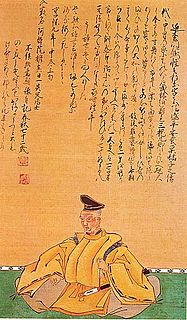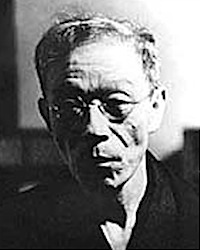 W
WChikamatsu Monzaemon was a Japanese dramatist of jōruri, the form of puppet theater that later came to be known as bunraku, and the live-actor drama, kabuki. The Encyclopædia Britannica has written that he is "widely regarded as the greatest Japanese dramatist". His most famous plays deal with double-suicides of honor bound lovers. Of his puppet plays, around 70 are jidaimono and 24 are sewamono. The domestic plays are today considered the core of his artistic achievement, particularly works such as The Courier for Hell (1711) and The Love Suicides at Amijima (1721). His histories are viewed less positively, though The Battles of Coxinga (1715) remains praised.
 W
WIzumi Kyōka , real name Kyōtarō Izumi , was a Japanese author of novels, short stories, and kabuki plays who was active during the prewar period.
 W
WOkuni was a Japanese shrine maiden who is believed to have invented the theatrical art form of kabuki. Thought to have begun performing her new art style of "kabuki" theatre in the dry riverbed of the Kamo River in Kyoto, Okuni's performances gained immense popularity, and were known for their performances, who were often lower-class women Okuni had recruited to act in her all-female troupe.
 W
WKawatake Mokuami (河竹黙阿弥) was a Japanese dramatist of Kabuki. It has been said that "as a writer of plays of Kabuki origin, he was one of the greatest, if not the greatest, Japan has ever known". He wrote 150 or so plays over the course of his 58-year career, covering a wide variety of themes, styles, and forms, including short dance pieces, period plays (jidaimono), contemporary genre pieces (sewamono), tragedies and comedies, as well as adaptations of foreign (Western) stories, though he is perhaps most famous for his shiranamimono, plays featuring sympathetic or tragic rogues and thieves. For the greater part of his career he wrote under the professional name Kawatake Shinshichi, only taking the name Mokuami on his retirement from the stage in 1881.
 W
WYukio Mishima , born Kimitake Hiraoka was a Japanese author, poet, playwright, actor, model, Shintoist, nationalist, and founder of the Tatenokai . Mishima is considered one of the most important Japanese authors of the 20th century. He was considered for the Nobel Prize in Literature in 1968, but the award went to his countryman and benefactor Yasunari Kawabata. His works include the novels Confessions of a Mask and The Temple of the Golden Pavilion as well as the autobiographical essay "Sun and Steel". Mishima's work is characterized by "its luxurious vocabulary and decadent metaphors, its fusion of traditional Japanese and modern Western literary styles, and its obsessive assertions of the unity of beauty, eroticism and death."
 W
WNamiki Gohei I was a Kabuki actor and playwright active in Kyoto, Edo and Osaka. He wrote over 100 plays, mostly in the genres of jidai-mono (historical) and sewa-mono.
 W
WNamiki Sōsuke, also known as Namiki Senryū, was a prominent Japanese playwright who wrote for both kabuki and bunraku. He produced around 47 bunraku plays, nearly 40 of them composed for jōruri, a particular form of musical narrative, and 10 kabuki plays. He is considered the second greatest Japanese playwright after Chikamatsu Monzaemon.